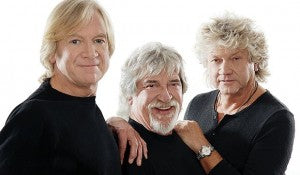NewsOK.com
British rockers The Moody Blues will play three Oklahoma shows in the coming days.
Four decades after The Moody Blues began blending rock and orchestral sounds, their lush and lyrical sonic style has maintained a level of popularity beyond anyone’s wildest dreams.
For instance, the British rockers’ signature ballad, “Nights in White Satin,” is seemingly “never reaching the end” of its dramatic appeal.
The legendary hit, from the group’s landmark 1967 album “Days of Future Passed,” recently landed at No. 2 on the U.K. Rock Chart and No. 27 on the BBC Radio 1 chart, marking the fourth time “Nights in White Satin” has charted in its more than 40-year-history.
“It’s really nice because it was made and sung originally from the heart, and if people can recognize that in it, that’s a wonderful thing to share, really,” said Moody Blues guitarist/singer/songwriter Justin Hayward in a recent phone interview from his home in Monaco.
The band — Hayward, bassist/singer John Lodge and drummer Graeme Edge — launched their 2011 U.S. tour earlier this week in New Orleans. They are playing three shows in Oklahoma: Saturday at Thackerville’s WinStar World Casino, Tuesday at Tulsa’s Brady Theater and Wednesday at Concho’s Lucky Star Casino.
Hayward, 64, said The Moodies, as the rockers are sometimes affectionately known, typically attract multigenerational audiences.
“We’re very lucky to have a real cross-section of people, and (there are) a lot of very young kids, as well, that we get mail from who are just discovering the music,” he said.
“I always tend to think that ‘oh, well, people have forgotten all about that.’ But still it turns up, and it seems new generations discover this music. We’re very fortunate that radio has always been open to us and we’ve had that kind of material,” he said.
“But I think the Moodies is based on songs and the strength of those songs instead of a sound or an image — I mean, we didn’t even have an image right at the beginning, and we didn’t do any press or anything like that in the early years — we just relied on our music. It’s very rewarding and very gratifying.”
Hayward has penned many of The Moody Blues’ hits, including “Tuesday Afternoon,” “Your Wildest Dreams,” “I Know You’re Out There Somewhere,” and, yes, “Nights in White Satin.”
“I’ve always been very selfish in my writing and what I record. And that makes me wrong more times than I’m right, really, about what other people will empathize with,” he said. “I’m just doing things that I want to do and hope that other people can share (in it). Because I think that’s the kind of duty that I have really: I’ve got to please myself first. So I’ve always trusted my own judgment there.”
He noted that his strategy has yielded many failures to go along with the successes.
“We did an album (in 1969) called ‘To Our Children’s Children’s Children,’ which was the first album on our own label, and we recorded a song on that called ‘Watching and Waiting.’ And when we recorded it, we all had a shiver up the spine and we said, ‘This is gonna be like a No. 1 song,’ and we put it out and it sold about 10 copies — and my mum bought half of those,” he said with a laugh. “So you never know, but you just gotta truck on trusting your own judgment and do what you think is right, and then it will be fulfilling.”
Still, the triumphs clearly outweigh the missteps: The Moodies have sold more than 70 million albums and earned 14 platinum and gold certifications.
The resurgence of “Nights in White Satin” can be traced to the British reality TV series “The X Factor.” Matt Cardle, who went on to win the seventh season of the singing contest, belted the passionate ballad on the show. Hayward was on tour in Dublin when Cardle’s performance aired around Christmas.
“Suddenly my phone lit up, and I thought, ‘I’ve never had so many bloody texts,’ and I opened it all and they said, ‘Oh you must see this, it was brilliant,’” he said. “He did a great version. He did it faithfully, he did it really, really well.”
Fans can expect The Moodies to faithfully perform their symphonic rock smashes, too.
“We’re very lucky. We could work almost every night of the year. We’re probably offered more work now than we were in the ’60s and ’70s. It’s remarkable,” he said. “But it’s a good time for bands who can play live, and that was always our thing ... and now here we are, it’s still happening for us.”

